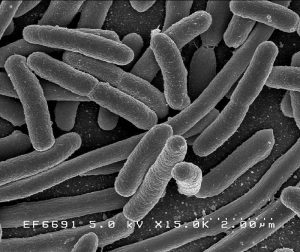Neuroscientists are studying the idea that intestinal microbiota might influence brain development and behavior.
Neuroscientist Knickmeyer is looking to study 30 newborns and how they have grown into inquisitive, curious one-year olds through a series of behavioral and temperament tests. She is eager to see their faecal microbiota, bacteria, viruses and other microbes that live in their guts.
Studies of animals raised in sterile, germ-free conditions showed that these microbes in the gut influence behavior and can alter brain neurochemistry and physiology. Some research has drawn links with gut bacteria and their interactions with the brain.

Escherichia coli, a species of bacteria present in the human gut https://en.wikipedia.org/wiki/Gut_flora#/media/File:EscherichiaColi_NIAID.jpg
Gut Reactions
Prior to recent research, microbes and the brain have rarely been known to interact, with the exception of when pathogens penetrate the blood brain barrier. When they do, there can be intense effects. For example, the virus causing rabies elicits aggression, agitation and a fear of water. The idea that gut microbes could influence neurobiology was not ever thought of, but this is changing.
One research study showed that IBS lead to issues such as depression and anxiety. This lead scientists to wonder if psychiatric symptoms are driven by inflammation or a whacky microbiome caused by infection.
One 2011 study showed that germ-free mice were less-anxious than mice with indigenous microbes. These studies also showed that many of these behaviors are formed during a critical period during which microbes have their strongest effects. Another problem is that “germ-free” is an unnatural situation. However, it allows for researchers to learn which microbial functions are important for development of organs or cell types.
Chemical Exploration
Recent studies have found that gut microbes directly alter neurotransmitter levels, enabling their communication with neurons.
Scientists are also studying whether or not altered serotonin levels in the gut trigger a cascade of molecular events, therefore affecting brain activity.
In 2015 research showed that myelination can also be influenced by gut microbes, at least in a specific part of the brain. Germ-free mice are protected from some conditions, for example multiple sclerosis, because it is characterized by demyelination of nerve fibers. These scientists wish to use these studies to help humans who suffer from MS.
A Move to Therapy
Tracy Bale, a neuroscientist, sought to study how microbes of pregnant mothers affect their offspring. Maria Dominguez-Bello, microbiologist, wants to see if babies born through Caesarean sections end up with microbiota similar to babies born vaginally if they are swabbed on the mouth and skin with gauze taken from their mothers’ vaginas.
For Knickmeyer, the amygdala and prefrontal cortex are the brain areas that interest her the most in her studies with the newborn infants. This is because both of these areas have been affected by microbiota manipulations in rodent models. Something she is worried might affect the study is the confounding factors such as diet, home lives and environmental exposure.
Source: http://www.nature.com/news/the-tantalizing-links-between-gut-microbes-and-the-brain-1.18557
For more information:
https://www.ncbi.nlm.nih.gov/pmc/articles/PMC4228144/
https://www.sciencenews.org/article/microbes-can-play-games-mind
http://www.huffingtonpost.com/healthline-/gut-bacteria-and-the-brai_b_11898980.html


Leave a Reply